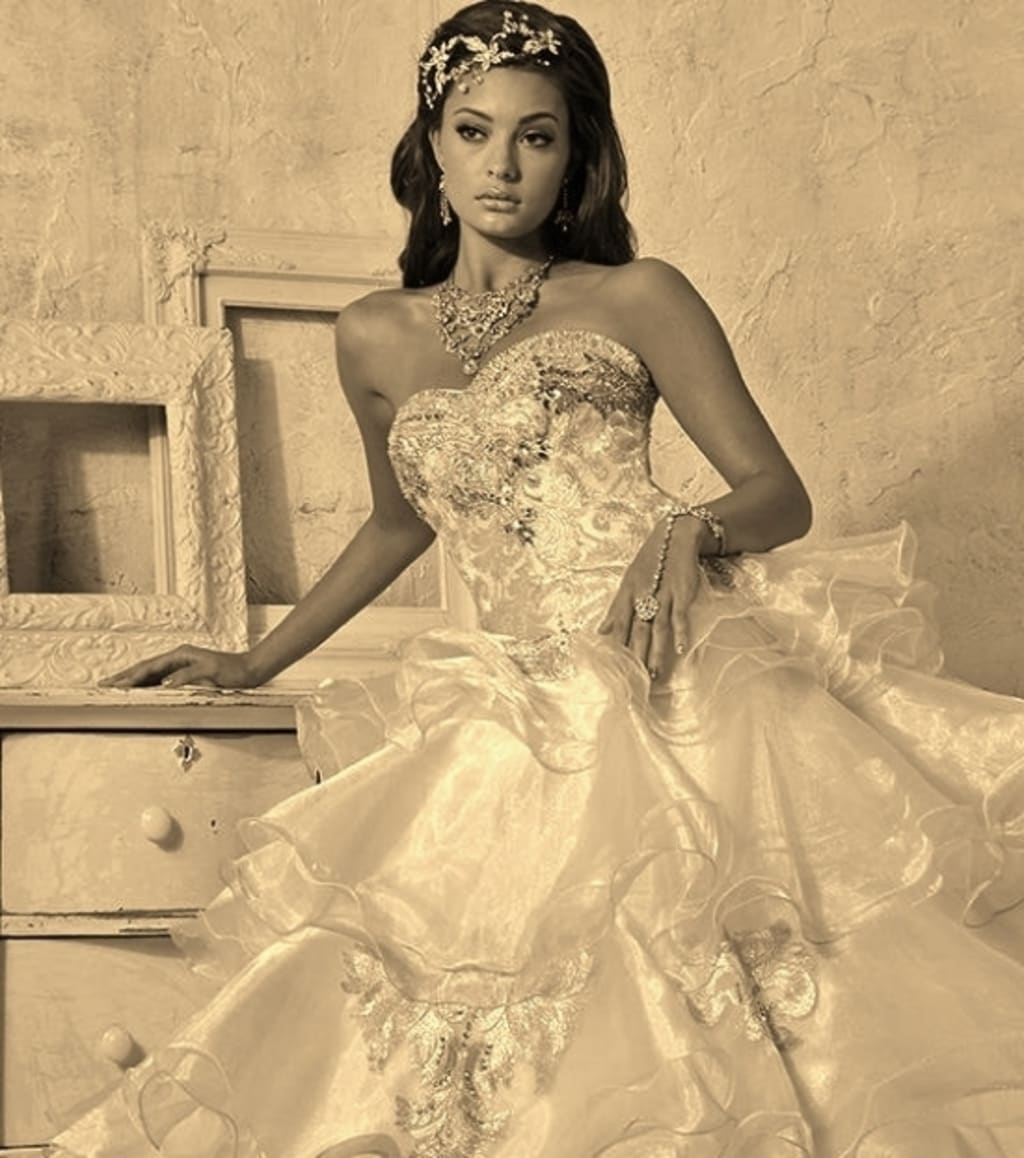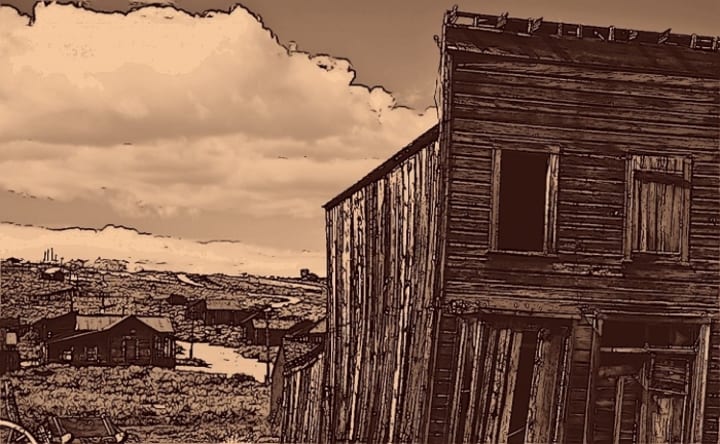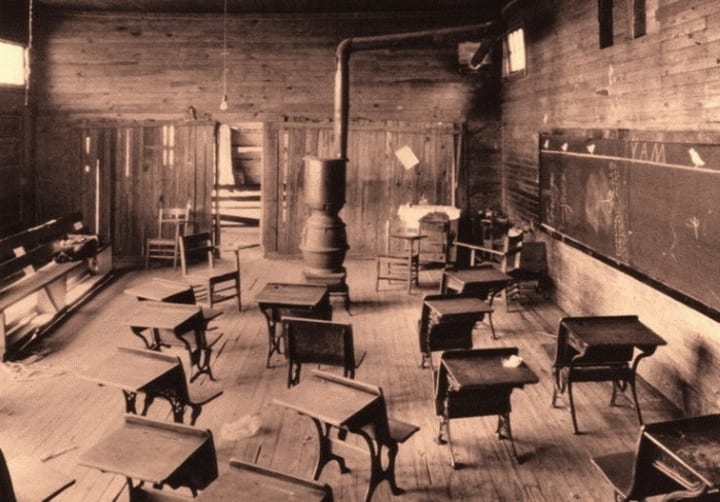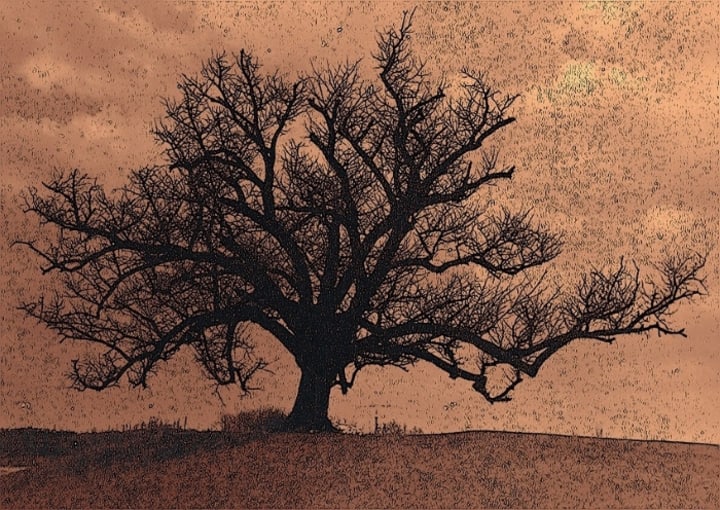
Part 1
The bustle and fluster that occurs around the quinceañera (kínseh - ani - éra) is a tradition that dates back to the Aztecs from around 500 B.C. Boys were psyched up for warrior-hood, and girls were prepared for marriage. Prior to this turning point, a girl would have been taught to cook and weave, and she would have been talked to about childbearing. After the arrival of the Europeans and with the mingling of cultures, girls came to be seen as the carriers of heirs, the ambassadors of feudal clans, the hope of familial extensions… and for some, it may have been decided that they might best represent their parentage by consigning themselves to nunneries.
In time, even these changes became diluted, and the fuss over a fifteen-year-old girl became nothing more than an elaborate spectacle in which parents felt compelled to lavish their daughters with expensive gowns or dresses and extravagant celebrations with every conceivable embellishment and indulgence. Indeed, some fathers have entered into woeful debt to ensure the most memorable occasion... to produce an unforgettable moment for their cherished one.
Before the border between the United States and Mexico had been legislated, Mexico had encompassed much of what are now Texas, New Mexico, Arizona, and possibly other land to the north and west. When the border was set, those people who lived north of it were still "Mexican" by race and culture, but they were now citizens of the United States.
This story, paraphrased from an old Mexican legend, takes place in a town not very far north of said border and in a time when most of those who lived there still thought of themselves as Mexican, although most of them were already second or third generation American-born citizens. The well-to-do drove late-model cars and smoked factory packaged cigarettes or cigars, while the rest, depending on their circumstances, drove the older vehicles and rolled their own cigarettes… and others still rode horses or got around in horse buggies.
The name of this community has been forgotten. After the circumstances, which will be related here, the town began to suffer from droughts and severe storms and unseemly accidents of destructive nature and considerable losses. People were compelled to move away and became unwilling to recall the story, until at last, the area became apparently lifeless and the town ghostly. By then, the city-limits post had been removed.
And now only the legend remained, brought up from time to time at some isolated campfire or during one of those nights when a storm takes out the power and the dark and silence become oppressive and excruciating, recounted with an air of apprehension and reluctance.
But in its day, there were farming and ranching and some sheep and goat herding in the outlying scapes. And in town, there were businesses that filled the developing needs. The general store had evolved into a grocery and meat market, ceding some of its merchandising to the new hardware store, the clothing and shoe store, and even the bakery and tortilleria. There was a new bank, which some people still did not understand and fewer people trusted. And a small Post Office had found a niche along the main avenue that led in and out of town.
There was a school with more than one room and teacher. There was also a new jail with more than one cell. An unassuming building, except for the daily sight of the flag duo, served as a courthouse, housing also a couple of offices of urban concerns. And a large town hall had been erected, answering the call for the gathering of citizens—to be informed of necessary reparations or proposed changes, for voicing their concerns as a community, for political debating and rallying, and also for community dances and festivities.
The aforementioned courthouse also held the offices of three lawyers, who had to expend much of their time and energy in other occupations in order to be counted among the well-to-do. Of these, the most successful and distinguished was a rancher/jurist known respectably as Don Román Amargúra, an ambitious man who was not unwilling to handle his dealings with ruthlessness and who could show fairness and leniency but only if it somehow progressed toward his account in the long or short of it.
His wife, Doña Atenea, was a statuesque woman of prideful countenance who held him to the fullest of his potential, insisting rather than encouraging that he avail himself of every visible opportunity, be it in ranching or in politics, which was the obvious course in the advancement of his lawyering. She settled for nothing, making it clear to one and all that she would have what she wanted, and she would have it her way, or someone somewhere would bear the blame and suffer for it.
Their nucleus of home and family was characterized with loyalty and reciprocal support. Love or affection was rarely, if ever, expressed in public or even in social circles, and the confidential expressions of intimacy and endearment were little more than misconceived exchanges of material presentations and tokens.
Part 2

Ghost Town
They had one daughter. When Marina Amargúra turned 1-year-old, her father presented her with a baby ring, made of silver and set with two slivers of pink tourmaline and one of diamond, barely perceptible except when glanced by the most effulgent sun rays, from which, ironically, she was customarily protected. In later years, having gained some insight into the value of precious metals and gems and the distinction between the two kinds of mountings on the tiny circlet, which by then was little more than part of the clutter in one of the compartments of a brimful jewelry box, she would at times criticize and complain emphatically as to why it wasn’t gold and why the stones could not all have been diamonds.
But this precedes the progression of other years, which naturally have been viewed by some as having been too few, and by others as a succession of dark and loathsome cycles that could not have ended too soon nor that could not have culminated in any way other than in the shocking and terrifying manifestation that occurred at the celebration of her fifteenth birthday.
The incidents that are related in the following paragraphs are few and far apart. It should be understood that Marina came to be perceived as a selfish, cruel, and overbearing child by her classmates, her teachers, and others in general. Much of this had to be handled with the utmost delicacy, because Don Román and Doña Atenea had wealth and clout and could themselves succumb to baser instincts if it was suggested that their little girl was something other than how they imagined her to be.
Her exploits and capers went far beyond what one might refer to as mischief and bordered on repugnant and malicious… and they were frequent. And this aura of darkness was apparent to some but not to others, her parents being of this latter group.
At first, the child was an epitome of innocence and daintiness, kept in curls and outfits of white and pink. Her little ring was adjusted in size for a few years and then was looped through a chain, which she wore around her neck for a few years more.
In her first year of school, before she had reached her seventh birthday, a classmate drew a great deal of attention by way of having brought a pet rabbit to class and delivering an entertaining and educational exhibition. For the greater part of that day, all the students sought out and crowded around this little boy. It was not so unusual to see a wild cottontail or a jackrabbit in this geographical environment, but this was a calico-coated domestic breed, which, although intimidated to some degree by the number of children and the exuberance, it responded well to being petted.
It did not seem to sit well with Marina that someone other than herself should be getting so much attention. It was noted by some of the students and the teacher that she had acted detachedly and in a sullen manner during their afternoon recess. And, by the end of the day, the rabbit had been found dead in its carry-box. The little boy did not come to school on the following day, and it was learned later that he had fallen ill with an unexplainable fever that lasted several days.
When Marina was eight, she was invited to the birthday party of one of her classmates. It had become apparent by then that Marina did not make friends or socialize very well, but her acquaintances did always try to be inclusive of her.
A piñata had been hung from a tree in the backyard, and one of the older boys had managed at last to land the stick on it successfully. When the colorful contents spilled on the grass, the children all swooped in excitedly but suddenly fell back, as if someone had grasped each one by the scruff of the neck and had forcefully pulled them away.
Marina then sauntered in airily and helped herself to the choicest pieces, selectively and unhurriedly, while everyone watched in wonder. The adults laughed nervously and eventually shrugged off the incident as a clumsy display on the part of the other children. But the other children, some of whose versions of the event could only be casually disregarded, felt something enigmatic and sinister had entered into their midst that day.
Part 3

The School Room
Marina always acted friendly, innocent, respectful, and obedient towards her parents and other adults. As she grew into her tenth year, her mother expected a lady-like transition and composure at all times. Her raven-lustered hair continued to be kept in curls, because it was considered fashionable and desirable of a young lady. The irises in her eyes were so dark that the pupils in them were indiscernible. And even at this young age, her visage was sultry and engaging. But for all her spurious sweetness, and it was spurious, other children and even the animals seemed inclined to give her a generous distance.
When Marina was 11, her father decided to teach her how to ride a horse, much against the approval of her mother. Eventually, it was conceded that this might provide a means of bonding between father and daughter. And if Marina showed exceptionalness, they could consider the possibility of promoting her into the competitive equine arena of the higher social venues.
But, as it turned out, the horses shied away from her. Even when Don Amargúra tried to lift her unto his own saddle, his horse reacted with such repudiation as to almost throw him. At this point, Marina walked quietly to the gate of the enclosure, in which all the horses were now keeping to the remote side. Her father watched in astonishment as she gazed intently into their midst. And then, she pointed to one, an 18-month old pinto, which at first shivered nervously and then apprehensively walked over to her and presented himself with a look of resignation.
Don Amargúra was at first uneasy because this pony had not yet been fully broken, but, in bafflement, he observed Marina as she showed complete mastery over the animal. She immediately named him Manchas, and he became her horse. It would be noticed in the few years that remained that this was the only relationship in which she displayed any sincere affection.
At the age of 12, Marina tended to go for long rides whenever she could and, by herself, would remain away from the house for much of the day. No one saw where she went, and she was vague in her conversations about it. Although her schoolwork and her grades were always in order and kept up, her parents implored her not to spend so much time wandering off alone.
A few head of livestock had gone missing, and Don Amargúra worried that there might be transient thieves in the vicinity. Then, one of the hands found some carcasses lying about the perimeter of the property, and they began to worry about wolves, jaguars, or other predators. It was the only logical postulation.
The hired hands on the Amargúra Ranch were not inclined to raise discussions or to question the rationalizations of the patrón. He was, after all, an educated man and one reputedly adept in the art of argument. Besides, they had seen the unfortunate consequences of those who expressed doubt in his judgments. And so, the one who had reported the carcasses, although his heart trembled with a superstition of dark doings, he did not forward the detail that the carcasses had only been dispossessed of their hearts.
Still and all, Marina continued to go off on her jaunts, and her parents found themselves inexplicably unable to communicate their concerns or admonitions.
At the age of 13, Marina stood rather tall and seemingly fully developed. Her face alone excited young men and old alike, and her glances and smiles caused many to commit sin in their thoughts.
It was during this time of her life that a young man of 19, Juanito Andadór, was hired on as a rookie ranch hand. He was reserved in his manner and unassuming, quick to learn and unafraid of the sometimes necessary risks. Everyone took an immediate liking to Juanito, for he was courteous and friendly, and he showed an estimable touch of forbearance with the livestock.
Juanito shared housing with some of the other men on the ranch and, like the others, was often seen shirtless at one of the water troughs, rinsing off the dust and sweat of the day. It was on more than one of these occasions that he caught the eye of Doña Atenea, who watched surreptitiously from a bedroom window. These circumstances of interest sometimes drew the attention of the budding Marina, and a competitive stimulation arose in her.
On a bright summer day, late in the morning, Marina mounted her pony and rode out into the pastures with a premeditated intent. In one of the farthest fringes of the property, she spotted Juanito mending a fence. This was not coincidental. She had been making furtive observations of the work assignments. In fact, had any known the true nature of the girl, it may have been said that she had wished it to happen.
She wasted no time in seducing the young man. In spite of his attribute of integrity, Juanito succumbed helplessly to her charm and enticement. She was irresistible.
After that incident, they were not physically intimate again. He could not go to her overtly, and she showed herself to him only at inopportune moments. In the brief interludes when they were able to talk, she began to make demands of him, with implications of letting their secret slip out and even suggesting at the end that she might be pregnant.
By "the end," Juanito was a broken man. Within weeks, he had become lacking in attentiveness and in his usual readiness. The men began to notice a decline in his sociability and orderliness. He took to imbibing and became alarmingly haggard in appearance. At "the end," they found him in that same remote pasture, hanging from the tree under which he and Marina had known each other with what he had thought had been a special and providential familiarity.
Part 4

The Hanging Tree
During her 14th year, Marina played coy with her father and often looked into her mother’s eyes with a smirk of patronization. She had become a tormentful tease with the boys, taking pleasure in breaking up relationships and leaving her expectants with unreachable aspirations. She had no time or use for those who sought after her, and those who knew her ways and tried to avoid her would somehow find themselves at her beck and call. Women saw something indefinable in her that aroused uneasiness, and men fawned around her as if in anticipation of some consideration that never flowered.
When she reached 15, there could be no such thing as too much for a girl like Marina. For Doña Atenea, every detail had to be a point of perfection. The dress was imported from Europe, with shoes to match and a tiara, the musicians were selected from Mexico City’s finest, and she personally oversaw the meticulousness of the decorating of the town hall. Don Román spared no expense. For him there would be no burden of debt. Everyone was invited, and all were expected to attend… in their best attire.
Marina had been born in late October. Most of the harvesting had been done, so there was at least some money to spare, even for the not so well-to-do. It would not have been taken well had someone arrived without brandishing some sort of gift. And the evening weather was comfortable enough for formal attire and garish accessories.
The event had been scheduled on a Friday so as not to present any conflicts with an ensuing day of work. By 8 o’clock, the festivities were well under way. In one corner of the hall, the presents were piling up into an enviable mound, to be opened later, during an interlude in the music and dancing. The women and older girls gathered in small groupings when they weren’t dancing and spoke quietly, sharing observations best kept muted. Between dances, the men stepped outside to indulge in their cigarettes and cigars, their ribald anecdotes, and, with grins and smirks, to pass around their little flasks of liquor, procured from the inner pockets of their jackets.
Every man and boy of age was expected to ask permission of Don Román, before he could ask the princess-of-the-day for a dance… that is to say, it was expected, although many of the boys were reluctant to do so. Doña Atenea stood by, giving subtle signals to her daughter, showing strong disfavor for some, disinterest for others, and condescending approval for a few… not that Marina reciprocated with any amenability, for it had become amusive for her to taunt her mother with shows of obstreperousness.
The youngster pranced about and flittered indefatigably, presenting herself more amiably than anyone had ever seen her. And indeed, it was remarked by many that, of late, this was the merriest and the most childlike comportment in which she had ever shown herself. It may have been seen, perhaps, as an unsettling irony, that at the occasion that was traditionally intended to showcase the emergence of a young adult woman, she was very much behaving like a little girl, which nevertheless inspired an inner secret pleasure in her father.
Part 5

Darkness
The eleventh hour was announced by one of the musicians. They would play one more song and then take an extended rest, during which time the young celebrant would be opening her presents.
It was at this time that a stranger appeared at the entrance. His visage was of such singularity that it drew everyone’s attention, effecting an ambiance of submissive quietude in the gathering and, at the same time, eliciting a wave of subdued murmurings and very hushed exclamations of admiration. Everyone was so taken with wonder that it was not outwardly noticed that he sidled himself towards the circle of hosts in a somewhat stealthy manner, where he presented himself with a most eloquent style.
His suit was of a lustrous black fabric and fashion that in itself stirred a mild curiosity. His hair was flawlessly black, shiny, and hanged about his shoulders in soft waves. He sported an impressive handlebar moustache and a beard strip that tapered to a point below his chin. His complexion was disturbingly colorless and almost clay-like. But upon meeting him face to face, this was overlooked, because, set against that blanchedness, in stark contrast, were two large, bright, and very child-like eyes that enticed an immediate enchantment on the perceiver.
He made eye contact with Doña Atenea first and nodded politely, glanced briefly and smiled at Marina, and then directed his attention to Don Román. “I hope you can forgive my intrusion, Señor Amargúra. I am Lucero de las Honduras, at your service (he bowed again)… an emissary on a diplomatic mission… from one capital to another. When I entered your town, only a moment ago, I was surprised to find it so empty. The sound of the festivities led me here, and I have been informed of the nature of your celebration. Again, I beg your forgiveness for my presumptuous intrusion.”
Don Román was only too pleased to return the civility of the stranger, “Not at all, Señor de las Honduras. I am very pleased that you found your way here. Please help yourself to some food and refreshment, and make yourself comfortable. If there is anything I can get…"
“Excuse me… I understand this is to be the last piece before a long intermission. It would please me greatly if you would grant me permission to ask your daughter for this dance.”
Don Román smiled glowingly, “Of course, of course.” He looked at Marina, “Hija, please accept this man’s request.” And he looked at his wife, who was also glowing with approval, and who nodded her confirmation even if it was only to herself.
Now Marina locked eyes with the stranger and curtseyed readily. The stranger took her hand and led her out onto the dance-floor, the music began, and they twirled grandiosely. Everyone’s eyes were fixed on what appeared to be a picturesque couple, she in her finery, lithe and desirable, and he clad as if he had planned on a fiesta, confident and arresting.
But then, an ambiance of dismay began to spread among the audience, the lights appeared to dim… murmurings, gasps, and soft shrieks became audible. The mass of people reacted in unison, stirring and shifting, someone screamed, and one of the more delicate of the women fainted. Some people were pointing at something that was at once horrific and abominable.
The gentleman, who had been seen as handsome and admirable, now holding Marina tightly against his chest, was dancing gracefully and sprightfully on a most grotesque pair of feet, one a caprine hoof and the other a cock’s foot, both appallingly adapted to the man’s proportions.
Upon seeing this, Doña Atenea screamed out her daughter’s name and started forward but was held back by her husband. The only people that dared to move were the ones who got out of the way as the couple danced toward the doors. The two stopped dancing, the music having ended since the initial observation of the anomaly, and they proceeded to walk out arm in arm, the hoof echoing dreadfully with every other step. At the threshold, Marina turned and gave her parents a parting look… She was no longer the child they knew, but beamed rather with a demeanor of dark and worldly wisdom.
While the shock was still wearing off, Doña Atenea glanced around flittingly and imagined how their status in the community would be affected by this horrible incident. Don Román, his head bowed in sadness and stupefaction, had a hand in his coat pocket, his fingers secretly fondling a little box that held a ring that he had planned on presenting his daughter... a ring of gold with a mounting of three diamonds. In the moment that followed, the town hall was filled with an oppressive and agonizing emptiness and a most excruciating silence.
r. nuñez, 10/2017
About the Creator
r. nuñez
I am a shamanic priest who loves to write stories, poetry, and songs. Retired, but still helping people, animals, and the planet.
Enjoyed the story? Support the Creator.
Subscribe for free to receive all their stories in your feed. You could also pledge your support or give them a one-off tip, letting them know you appreciate their work.






Comments
There are no comments for this story
Be the first to respond and start the conversation.